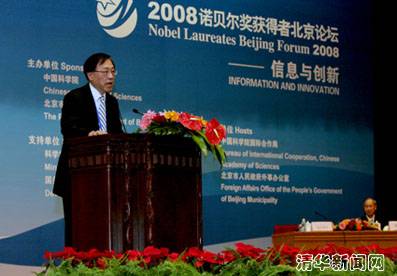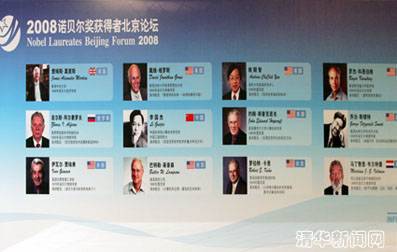On the morning of Nov.11, Beijing Forum for 2008 Nobel Laureates was opened at the Great Hall of the People. Seven Nobel Prize Winners and four Turing Award Winners attended this forum. International top scholars, from the field of physITCS, economITCS, biology, chemistry and information science, gave wonderful lectures on their latest research results.
Yongxiang Lu, Vice Chairperson of the NPC Standing Committee and President of Chinese Academy of Science, gave a keynote speech in the opening ceremony. Former Vice Chairperson of the NPC Standing Committee Jialu Xu, Mayor of Beijing Jinlong Guo, and Vice Minister of Ministry of Science and Technology attended the opening ceremony. Prof. Sir James A. Mirrlees, 1996 Nobel Laureate in Economic Sciences, gave a speech of gratitude.
In the academic forum after the opening ceremony, Prof. Andrew Chi-Chih Yao from Advance Study Centre in Tsinghua University gave a speech on The Science Behind Information Technology. Prof. Yao mentioned in his talk that computers, Internet and information technology have developed into the basis of all kinds of work and people’s daily life. Behind all the marvelous computing and communication hardware is modern information technology, which helps us design the operational rules to operate the equipment and usually develops into necessary conception for brand-new applications.

He claimed that information technology in the 21st century faces many major issues, such as Internet security, processing data of huge amount, great impact of information technology on physITCS, medical treatment, biology and economITCS and so on. The solution of these problems is urgently needed in the way of breakthrough in theory and creativity in technology.
How to get breakthrough in theory and creativity in technology? Prof. Yao set several live examples to illustrate that breakthrough in theory and creativity in technology happen when different disciplines and different theories combine and cross mutually and meanwhile when a new kind of technology could be used and become applicable. For example, security problem in cryptography made breakthrough because of combination between Shannon’s Random Number Theory and Turing’s Computability Theory and mature application of electronic technology. Take quantum computing for another example, new quantum computing technology is the combination between physITCS and computer science and mature application of quantum technology. Some significant breakthroughs and creativity require combination of different disciplines.
Professor from College of Information and Technology in Tsinghua University and Director of Information and Technology Section in the Chinese Academy of Science Yanda Li hosted this session. Prof. Yanda Li mainly introduced the great contributions made by Prof. Yao in the field of information technology and gave some comments on Prof. Yao’s lecture.
This forum will last four days, and is held by Beijing Government and the Chinese Academy of Science. The forum takes “Harmony and Development” as the permanent theme and “information and innovation” as annual theme. “Information and Innovation Strategy Forum”, “Information and Innovation Academic Forum”, “Chinese Academy of Science Senior Academic Forum” and “Zhongguancun Forum” will be held during these four days, and distinguished guests will give more than 50 wonderful lectures.

Seven Nobel Laureates presented in this forum are 2006 Nobel Laureate in Chemistry ROGER D. KORNBERG, 1973 Noble Laureate in PhysITCS IVAR GIAEVER, 1999 Nobel Laureate in PhysITCS MARTINUS J.G. VELTMAN, 2000 Nobel Laureate in PhysITCS ZHORES I. ALFEROV and 2004 Nobel Laureate in PhysITCS DAVID J. GROSS, 1996 Nobel Laureate in Economic Science JAMES A. MIRRLEES and 1997 Nobel Laureate in Economic Science MYRON S. SCHOLES. Four Turing Award Laureates are ROBERT KAHN, JOHN HOPCROFT, BUTLER LAMPSON and ANDREW YAO.
On the morning of Nov.12, Nobel Laureate in PhysITCS DAVID J. GROSS came to Tsinghua and gave a marvelous lecture on fundamental physITCS for faculty and students and was invited to be an Honorary Professor in Tsinghua University.
Beijing Forum for Nobel Laureates has already been held for three years and it has become the signal of “Academy in Beijing”. The difference between this forum and former three ones lies in hierarchy and variety. The host hopes to enhance youth’s and citizens’ interest in science through the interaction between Nobel Laureates and citizens. (Article by Yuexuan Wang, photos by Haijun Guo and edited by Kai Cui)